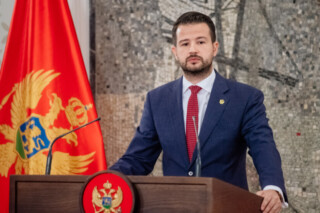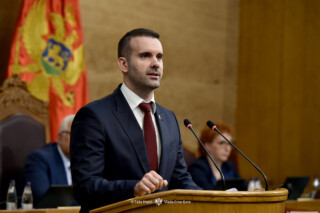By Andrej Nikolaidis, CdM columnist
From Aleksandar Vucic to the last bot of his internet-irregulars – they all repeat the thesis that someone claims and wants to prove that the Serbs are the genocidal people. Milan Knezevic is also repeating it, accusing President Milatovic: “Only two days after his victory in the presidential election and I knew that the commander-in-chief was going to tell that the Serbs are the genocidal people, that Kosovo is an independent country and that Russia is the state’s No. 1 enemy”. https://www.cdm.me/politika/knezevic-vrhovni-komandant-me-izgleda-zamijenio-sa-vojnim-kuvarom-pa-ocekuje-raport-koliko-ce-se-jos-krckati-pasulj/
Of course, Jakov Milatovic didn’t tell that ” the Serbs are the genocidal people”. Nor did I – because I don’t talk nonsense.
The Serbs are not genocidal. No peoples are genocidal. It’s why all the blame for war crimes is on individuals. To condemn the Srebrenica genocide doesn’t mean you proclaim the Serbs genocidal. The idea of genocidal peoples is right-wing and I despise it.
Just as I feel disgust for those who – by avoiding criminal, but not ethical responsibility – continuously promote policies that relativize and deny the genocide in Srebrenica. One of the strategies of the Srebrenica genocide denial is precisely the thesis that condemning that genocide means condemning all Serbs. In fact, genocide deniers take the entire Serbian people as a human shield behind which they hide war criminals and, most importantly, their crimes and responsibility for Srebrenica.
Instead of hiding crimes behind Serbdom, the responsible political and intellectual elite would try to remove the ideology that led to the genocide from society, the educational system, cultural and scientific institutions, and of course from the parliament, the judiciary and the government – the ideology that inspired Ratko Mladic when he came to Srebrenica, telling that the time had finally come to take revenge on the “Turks” in that area as well.
That ideology is called Great Serbia nationalism.
Debating whether a genocide was committed in Srebrenica is like debating whether the Earth is a flat plate carried on the backs of two elephants. It’s undebatable. Such a debate is not a proof of democracy, but of moral idiocy. Who would talk about Srebrenica as a conspiracy against the Serbs and about the Earth as a flat plate – he should contact Dr. Nestorovic. You won’t talk about that with me, even if you burn me three times a day.
Hannah Arendt witnessed the trial of Eichmann in Jerusalem, after which she had that idea of the “banality of evil” – one of the most wrong I know. Evil is anything but banal. If evil is banal, so is the good that opposes it. Their fight is also banal. From there, one quickly arrives at moral relativism and a “pragmatic” policy that proposes dialogue as a universal remedy, a policy that insists that “the enemy is only the one whose side of the story we haven’t heard.” Let me paraphrase Zizek at this point and ask: does this also apply to Hitler? I read “Mein Kampf” – so I heard his side of the story, just as I heard the side of the story of the apologists for the Chetnik persecutions and the Srebrenica genocide. I read them all. And you know what? In terms of ethics, now I find them even more disgusting.
In his brilliant book Les biblioclasters – le Bessie et l”autodafe, Gérard Haddad presents a thesis opposite to that of Arendt. He detects hatred towards the Book in Eichmann. At the beginning of the trial, Eichmann refused to swear on the Bible. In the Land of the Book, he refused to swear by the Book, Haddad notes. On the electric chair, the pastor suggested Eichmann read the Bible together. He nervously refused, saying that “there is no time to lose”. In both cases when he rejected the Bible, Eichmann claimed to be a Gottglaübiger – one who believes in God. Ok, but which God? Definitely not Christian.
It’s possible that Eichmann believed in the same God that Ratko Mladic believed in, another “hero, but not a criminal”. I don’t know. Just as I don’t know which God Mladic’s defenders believe in. I only know it’s not the Christian God.
As I said, Arendt was watching Eichmann and saw the banality of evil. When I watched Mladic luring the terrified children of Srebrenica like kittens, handing out sweets to little human beings whose parents he will brutally kill tomorrow, I saw nothing banal there. I saw Evil in its full deceitful, lying, tormenting, cowardly, black-hole darkness.
(The opinions and views of our columnists aren’t necessarily those of the CdM news team)




